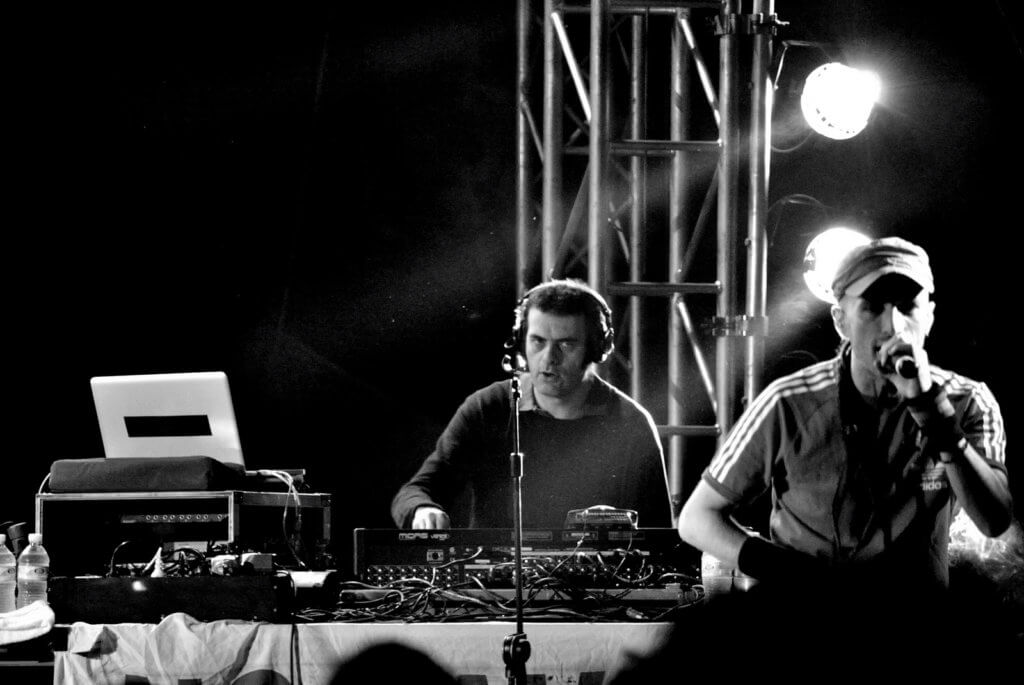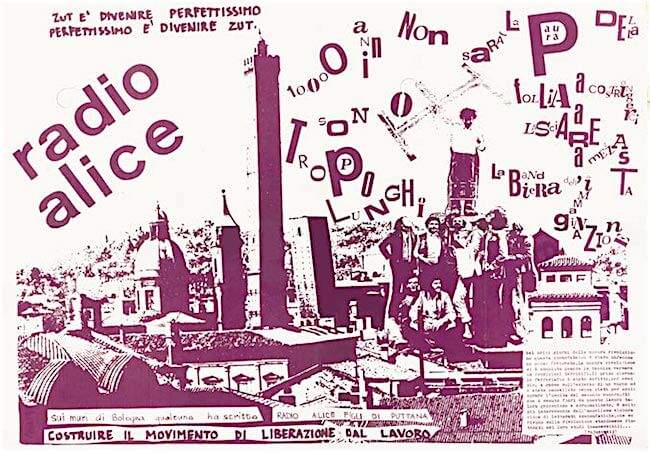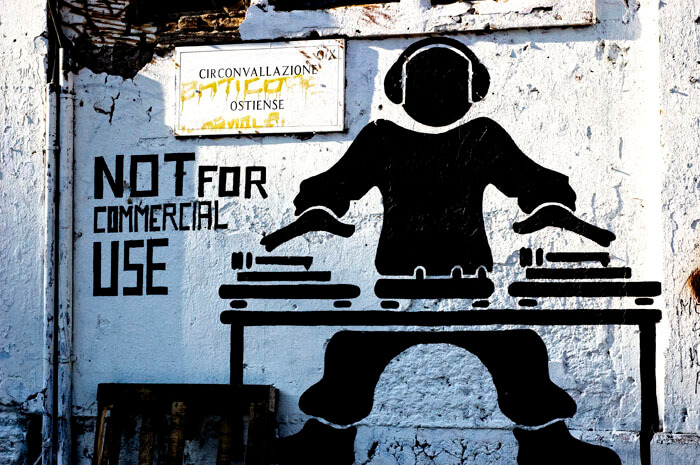In Italy, every day a small group of radio stations give voice to the voiceless: from social and environmental movements to immigrants and ethnic Roma who suffer discrimination. These are the “free radio”, a group of progressive and non-commercial broadcasters around Italy – from Turin, in the North, to Cosenza, in the deep South – who try to cover the kind of news that the mainstream media does not. Today, the free radios are trying to find a balance between their mission of broadcasting content that is outside the mainstream and the need for economic sustainability.
Unlike commercial radios, free radios aren’t supported by large media companies – which gives them editorial independence but also means that they struggle financially. To further complicate their economic situation, they are extremely selective in the advertising they accept (many run ads only for ethical companies), if they accept advertisements at all.
What mostly distinguishes them, says Tiziano Bonini, a researcher at the University of Siena specialized in media studies, is that “free radios answer [ie: “feel obliged to be accountable”] only to their own listeners and they do not need to create profit for shareholders.” When a radio makes money, the profit is reinvested in the radio.
Three of the most well known radios of this kind are Radio Popolare in Milan, Radio Blackout in Turin and Radio Onda Rossa in Rome. Founded in 1976, Radio Popolare is the oldest non-commercial radio still running in Italy. Radio Onda is just one year younger, while Radio Black Out was born in 1992.
Despite their lack of resources, these three stations have been able to extensively cover important topics that the mainstream media would sooner bypass – such as police violence, the gentrification of poor neighborhoods, the revolutionary Kurdish movements in Rojava, Iraq. They have also kept covering the democratic revolutions in the Middle East for a longer period compared to the mainstream media.

In Turin, Radio Blackout was the first radio to give voice to the protests of the inhabitants of the Val Susa against the construction of the high-speed Turin-Lyon line, a long tunnel drilled into the mountains which critics argue is damaging to the environment and costing the government big money that could be spent in a wiser way. The citizens in Val Susa who protested the railway were demonized by the mainstream media. But on Radio Blackout they had their own radio show, called “Radio No Tav” (Tav is an acronym for high-speed train in Italian).
Radio Popolare sets itself apart because “it’s the radio that broadcasts the most international news in Italy”, as Bonini says. Radio Onda Rossa, on the other hand, is well known for “giving voice to grassroots campaigns”, says Cristina, who has been an editor for the Roman radio since 1994. As a longterm policy, the staff of Onda Rossa use only their first names. Another distinctive policy is that they let everyone speak: “We have had the same phone number for 40 years. Just call and you will be on the air”, Cristina continues. She said that often the people who call the radio wanting to talk are from workers’ unions fighting on some labor rights issue.
While the mainstream media claim to be impartial, the free radios are proud of their political identity. “We believe which stories get to be told, and people having a choice in who gets to be interviewed, means that [the journalist] is already taking a side. [Working in the] news requires making choices, and making choices requires a thoughtful position. We are convinced that every part of the media makes choices, but we do it openly and we are left-leaning politically” says Lorenza Ghidini, senior editor of Radio Popolare.
A bit of history
Until the mid-1970s, Italy only authorised the programming of public broadcasters – the Radio Rai network, whose programs were controlled by a special commission that censors uncomfortable content. Radio frequencies were liberalized in 1976. Soon afterwards, leftwing organizations, such as Autonomia Operaia or Lotta Continua began opening up their radio stations. In the same period Radio Popolare and Radio Onda Rossa were born, as well as the now-defunct Radio Alice and many others.
The 1970s were a time of social and political upheaval in Italy and the birth of free radios was intertwined with the student movements, feminism and workers’ rights movements, who for the first time could make their voices heard without any intermediary. “The social movements needed to deconstruct the language of [those in] power and to create their own language. They needed to show the dark side of power” explains William Gambetta, researcher at Centro Studi Movimenti of Parma.
In the early 1980s, many free radios begun to shut down: the high management costs, the reordering of radio frequencies so that it favours the creation of large oligopolies and the fierce repression of social movements, made their job too difficult.
Yet, a new generation of free radios was still to come. In the mid 80’s Radio Onda d’Urto was born in Brescia. In 1992, Radio Blackout was founded in Turin, still the youngest of the bunch. But a few years later, a new broadcast law made it too expensive to open up non-commercial radio.

A community of listeners
Today, it’s thanks to listeners if free radios are still active. Radio Onda Rossa organizes some fundraising concerts in Rome’s community centres. Radio Blackout in Turin and Radio Onda d’Urto in Brescia also organize summer festivals with concerts, debates and book launches.
Radio Popolare, however, began accepting advertising in 2000. But most of its financial income comes from a particular form of subscription – in practice, supporters pay a voluntary subscription even if they can freely listen to the radio regardless of whether they pay or not. “The economic crisis has drained advertising revenue, so now we depend much more on the support of listeners. We have about 15,000 supporters who give a fixed share each year. And that is something special. We are not just a radio, we are a community”, says Ghidini.
But do free radio have any impact? Do they contribute to shaping the public debate?
According to Bonini, not so much. He argues there’s just too few of them of them to make a difference and that they are local radios anyway. “Free radios give voice to the voiceless. But it’s just Radio Popolare and some other local radio here and there. They don’t counterbalance the gap between mainstream media and common sense.”
Meanwhile, many of the innovations invented by the free radios have passed to the mainstream media. For instance, the “open microphone”, the possibility for listeners to comment on a specific theme, is used today by many commercial radios.
The concentration of media ownership in Italy paradoxically should stimulate forms of dissent says Alessandro Robecchi, former program director of Radio Popolare, who is now working as a TV author. “The prevalence of ideological conformism should stimulate dissonant voices. I think of a free radio as a megaphone of a society that does not accept and disputes the current narrative.”

It would be wrong to reduce the radios to a relic of the golden age of social movements.
Undoubtedly the concentration of media ownership and the relationship between the media and politics in Italy is really strong, so it’s very difficult for different voices to be heard. But while the mainstream media are only interested in what happens in the corridors of power, free radios offer a possibility to be heard for all those groups who are ignored by the mainstream media and discriminated against by society.
Cristina, the news editor of Radio Onda Rossa, is convinced that free radios are still important for many: “When we open the microphones, there’s always someone calling. Maybe they do not agree with us, but still they have thought about the issues, and that’s important. This means that, in 2017, there are still people listening to the radio and who think that we are important.”
This article was first published on openDemocracy’s ‘Can Europe Make it?’
![Political Critique [DISCONTINUED]](http://politicalcritique.org/wp-content/uploads/2015/09/Political-Critique-LOGO.png)
![Political Critique [DISCONTINUED]](http://politicalcritique.org/wp-content/uploads/2015/09/Political-Critique-LOGO-2.png)